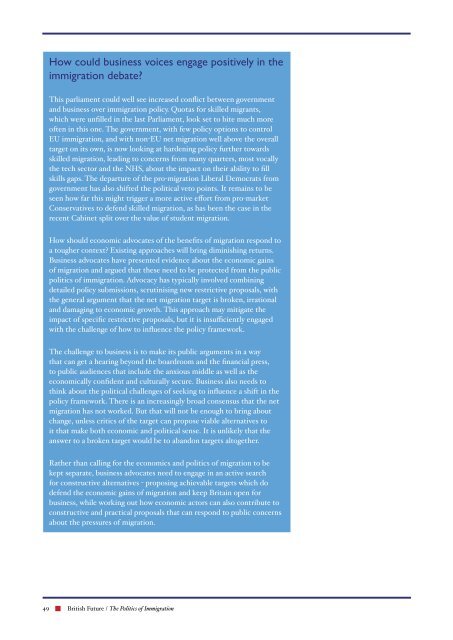THE POLITICS OF IMMIGRATION
The-politics-of-immigration
The-politics-of-immigration
You also want an ePaper? Increase the reach of your titles
YUMPU automatically turns print PDFs into web optimized ePapers that Google loves.
How could business voices engage positively in the<br />
immigration debate?<br />
This parliament could well see increased conflict between government<br />
and business over immigration policy. Quotas for skilled migrants,<br />
which were unfilled in the last Parliament, look set to bite much more<br />
often in this one. The government, with few policy options to control<br />
EU immigration, and with non-EU net migration well above the overall<br />
target on its own, is now looking at hardening policy further towards<br />
skilled migration, leading to concerns from many quarters, most vocally<br />
the tech sector and the NHS, about the impact on their ability to fill<br />
skills gaps. The departure of the pro-migration Liberal Democrats from<br />
government has also shifted the political veto points. It remains to be<br />
seen how far this might trigger a more active effort from pro-market<br />
Conservatives to defend skilled migration, as has been the case in the<br />
recent Cabinet split over the value of student migration.<br />
How should economic advocates of the benefits of migration respond to<br />
a tougher context? Existing approaches will bring diminishing returns.<br />
Business advocates have presented evidence about the economic gains<br />
of migration and argued that these need to be protected from the public<br />
politics of immigration. Advocacy has typically involved combining<br />
detailed policy submissions, scrutinising new restrictive proposals, with<br />
the general argument that the net migration target is broken, irrational<br />
and damaging to economic growth. This approach may mitigate the<br />
impact of specific restrictive proposals, but it is insufficiently engaged<br />
with the challenge of how to influence the policy framework.<br />
The challenge to business is to make its public arguments in a way<br />
that can get a hearing beyond the boardroom and the financial press,<br />
to public audiences that include the anxious middle as well as the<br />
economically confident and culturally secure. Business also needs to<br />
think about the political challenges of seeking to influence a shift in the<br />
policy framework. There is an increasingly broad consensus that the net<br />
migration has not worked. But that will not be enough to bring about<br />
change, unless critics of the target can propose viable alternatives to<br />
it that make both economic and political sense. It is unlikely that the<br />
answer to a broken target would be to abandon targets altogether.<br />
Rather than calling for the economics and politics of migration to be<br />
kept separate, business advocates need to engage in an active search<br />
for constructive alternatives - proposing achievable targets which do<br />
defend the economic gains of migration and keep Britain open for<br />
business, while working out how economic actors can also contribute to<br />
constructive and practical proposals that can respond to public concerns<br />
about the pressures of migration.<br />
49 British Future / The Politics of Immigration


